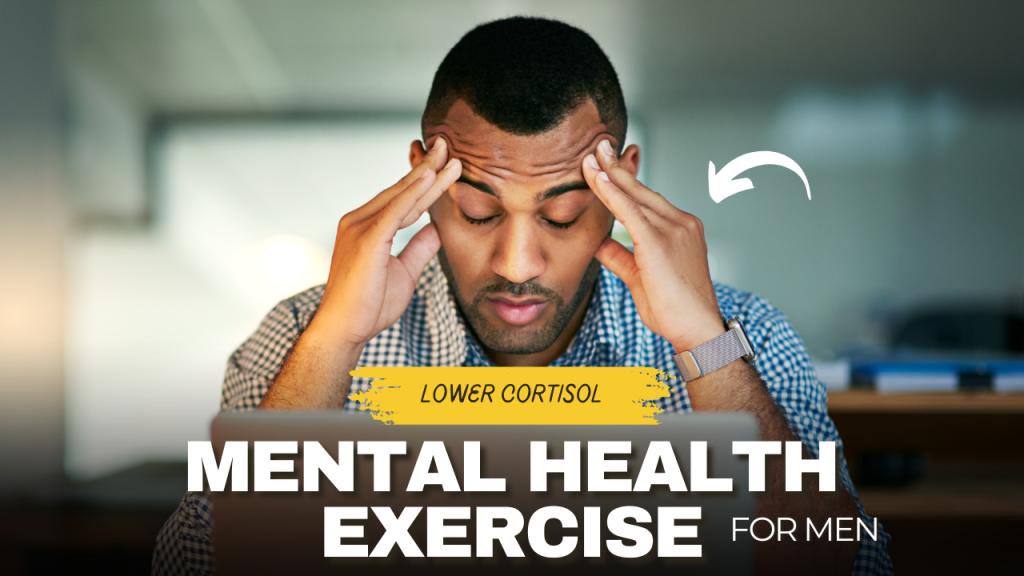Ever felt like stress is silently draining your energy, fogging your mind, and wearing you down? You’re not alone—and it’s not just “in your head.” Chronic stress in men is directly linked to elevated cortisol levels, a hormone that, when persistently high, can wreak havoc on your mental and physical health. The good news? Exercise is a proven, natural, and powerful way to fight back.
In this guide, we’ll explore mental health exercises specifically designed for men to reduce cortisol, sharpen focus, boost mood, and build long-term emotional resilience. Whether you’re juggling career pressures, family responsibilities, or personal struggles, these exercises are your toolkit to regain mental clarity and strength—without needing a therapist or a prescription pad.

Perks of Mental Health Exercises That Lower Cortisol in Men
- Reduces Chronic Stress Naturally
Regular physical activity helps regulate the body’s stress response and keeps cortisol levels in check—without medication.- Improves Mood and Emotional Stability
Exercises like HIIT, yoga, and walking boost serotonin and dopamine, which fight anxiety and depression.- Enhances Sleep Quality
Lower cortisol leads to better melatonin production, helping men fall asleep faster and enjoy deeper rest.- Boosts Testosterone and Hormonal Balance
Certain exercises reduce cortisol while supporting testosterone—vital for mood, energy, and strength.- Strengthens Cognitive Function
Reduced stress levels improve focus, memory, and decision-making—especially important for busy professionals.- Promotes Healthy Weight and Fat Loss
Lower cortisol = less belly fat retention. Exercise also boosts metabolism and improves insulin sensitivity.- Builds Emotional Resilience
Regular workouts increase stress tolerance and emotional adaptability, making it easier to handle life’s pressures.- Supports Heart and Brain Health
Lower cortisol reduces the risk of high blood pressure, heart disease, and brain fog.- Improves Confidence and Mental Clarity
The combination of physical strength and emotional control gives a sharp mental edge in daily life and work.- Encourages Routine and Discipline
Daily movement instills structure, which is key to long-term mental wellness and cortisol control.
Do’s and Don’ts of Mental Health Exercise
| Do’s | Don’ts |
|---|---|
| Practice regular moderate exercise (3–5 times a week) | Overtrain or push your body without rest |
| Include breathing exercises, meditation, or yoga | Ignore recovery or sleep after workouts |
| Go for daily walks, preferably in nature | Sit idle or remain sedentary for long hours |
| Prioritize quality sleep and hydration | Stay up late scrolling or skip sleep |
| Choose strength training or bodyweight workouts | Do excessive endurance cardio (long-distance running) |
| Use short, focused HIIT sessions (20–30 mins) | Overdo long HIIT or intense cardio daily |
| Maintain a consistent workout schedule | Skip workouts for several days, then overcompensate |
| Listen to your body and adapt intensity based on stress levels | Ignore signs of burnout or chronic fatigue |
| Fuel with whole foods and protein-rich meals post-workout | Eat processed foods and high sugar right after training |
| Incorporate mindful breathing before or after workouts | Let stress build up without mental resets |
What Happens After 30 Days of Cortisol-Lowering Exercise
| Timeframe | Expected Changes |
|---|---|
| Week 1 | – Mood begins to improve – Stress starts to feel more manageable – Better sleep onset |
| Week 2 | – Noticeable drop in anxiety – Increased energy and focus – More stable emotions |
| Week 3 | – Reduced belly fat (from cortisol drop) – Improved confidence – Enhanced mental clarity |
| Week 4 (Day 30) | – Balanced cortisol levels – Sharper cognitive performance – Restful sleep patterns – Better emotional resilience – Stronger workout recovery and hormonal health |
Note: Individual results vary based on consistency, sleep, diet, and overall lifestyle. But even small, consistent steps over 30 days can lead to powerful transformations—mentally, physically, and hormonally.
Why Cortisol Matters for Men’s Mental Health
Cortisol is your body’s primary stress hormone. While it’s crucial for managing danger and energy levels in short bursts, chronically elevated cortisol leads to:
- Anxiety and depression
- Brain fog and poor memory
- Trouble sleeping
- Low testosterone
- Belly fat accumulation
- Burnout
In men, these symptoms often go ignored or unspoken due to social conditioning. But that silence can cost you—your peace, productivity, and physical health.
Best Mental Health Exercises for Men That Lower Cortisol
Below are science-backed, practical exercises that target both the body and the brain, helping reduce cortisol naturally.
1. High-Intensity Interval Training (HIIT) – The Cortisol Balancer

Why it works: HIIT boosts endorphins (natural mood enhancers) and lowers cortisol post-exercise, especially when done in short bursts.
How to do it:
- 20 minutes, 3–4 times per week
- Mix sprinting, burpees, or kettlebell swings
- 30 seconds of max effort, 30 seconds rest
Tip: Avoid overtraining—too much intensity without rest may actually spike cortisol.
2. Resistance Training – Strengthen Mind and Muscle

Why it works: Lifting weights not only boosts testosterone and confidence but also reduces cortisol when done moderately.
How to do it:
- Full-body workouts 2–3 times a week
- Focus on compound movements (squats, deadlifts, bench press)
- Keep sessions under 60 minutes
Mind-Muscle Bonus: The focus required during lifts acts as active meditation.
3. Walking in Nature (Green Exercise)

Why it works: Walking outdoors—especially in green spaces—lowers cortisol within 20 minutes. It also improves sleep and reduces anxiety.
How to do it:
- Aim for 30-minute walks in a park or nature trail
- Leave your phone behind or keep it on silent
- Practice deep breathing while walking
Bonus: Forest bathing (Shinrin-yoku) has been clinically shown to reduce stress hormones and lower blood pressure.
4. Box Breathing – Tactical Calm for Men Under Pressure

Why it works: Used by Navy SEALs, this breathing technique activates the parasympathetic nervous system, rapidly calming the body.
How to do it:
- Inhale for 4 seconds
- Hold for 4 seconds
- Exhale for 4 seconds
- Hold for 4 seconds
- Repeat for 5–10 minutes daily
Add it to your morning routine to set a grounded tone for the day.
5. Yoga for Men – Flexibility, Focus, and Cortisol Control

Why it works: Yoga combines breath control, movement, and mindfulness, which together dramatically lower cortisol.
How to do it:
- Start with beginner-friendly routines like Hatha or Vinyasa yoga
- 2–3 sessions per week
- Focus on deep breathing and posture alignment
Don’t worry—yoga isn’t just for women. Athletes and entrepreneurs alike use it to reset mentally.
6. Cold Showers or Contrast Therapy

Why it works: Cold exposure trains the nervous system to handle stress better. Over time, it helps regulate cortisol production.
How to do it:
- Finish your shower with 30–60 seconds of cold water
- Gradually increase as you adapt
Pro tip: Combine with breathwork for maximum mental reset.
7. Mindful Journaling – A Mental Cleanse for Men

Why it works: Writing out your thoughts reduces rumination and gives clarity. It’s an underrated form of emotional release.
How to do it:
- Write 1–2 pages a day in a notebook
- Focus on gratitude, stressors, or solutions
- No grammar rules—just flow
Use it after workouts or before bed to unwind.
Other Key Tips to Naturally Reduce Cortisol
- Sleep 7–9 hours per night (optimize your sleep hygiene)
- Limit caffeine after noon
- Maintain stable blood sugar (eat protein-rich meals)
- Stay hydrated
- Laugh more – even 10 minutes of laughter can reduce cortisol
Final Thoughts: Take Control of Your Stress—Before It Controls You
In a world where men are expected to perform under constant pressure, managing cortisol levels is not a luxury—it’s survival. These mental health exercises aren’t just physical routines; they’re daily disciplines that reclaim your mind, restore your mood, and reinforce your mental armor.
Start small. Pick one or two of these cortisol-lowering exercises and commit to consistency, not perfection. Your mind, body, and future self will thank you.
Frequently Asked Questions (FAQs)
What is cortisol and why is it bad for men’s health?
Cortisol is a hormone released by your adrenal glands in response to stress. While it helps in short bursts, chronic high cortisol can lead to anxiety, low testosterone, weight gain (especially belly fat), fatigue, and even depression in men.
How does exercise reduce cortisol levels in men?
Exercise boosts endorphins and dopamine, which are natural stress relievers. Certain types of workouts—like HIIT, strength training, yoga, and walking—help regulate the body’s stress response and reduce cortisol over time, especially when balanced with proper recovery and sleep.
How often should I exercise to manage my stress and mental health?
Aim for 3–5 times per week, mixing strength training, cardio, and calming practices like yoga or breathing exercises. Consistency is key—not intensity. Even short daily walks or 10-minute workouts can lower stress levels effectively.
Can lifting weights really help with stress and anxiety?
Yes. Resistance training improves mood, builds confidence, and has been shown in studies to lower cortisol levels. Just avoid overtraining, which can have the opposite effect and increase stress hormones.
What time of day is best to exercise for lowering cortisol?
Morning or early afternoon is generally best. Cortisol is naturally higher in the morning, so exercising during that time can help regulate your daily rhythm. Evening workouts are fine too—just avoid overly intense sessions close to bedtime.
Are there exercises I should avoid if I have high cortisol?
Yes. Avoid long-duration endurance cardio (like running for hours) and intense daily workouts without recovery, as these can raise cortisol further. Rest and recovery days are just as important as the workouts themselves.
How long does it take to see results from cortisol-lowering exercises?
Some effects—like a mood boost or relaxation—can be felt immediately after a session. For long-term cortisol regulation and mental health improvement, expect consistent results in 2–4 weeks of regular practice.
Can lifestyle changes alone lower cortisol, or do I need medication?
For most men, lifestyle changes—including proper exercise, sleep, nutrition, and stress management—are highly effective at lowering cortisol naturally. However, if cortisol remains high despite changes, consult a healthcare provider to rule out underlying conditions.






Awesome
Very good